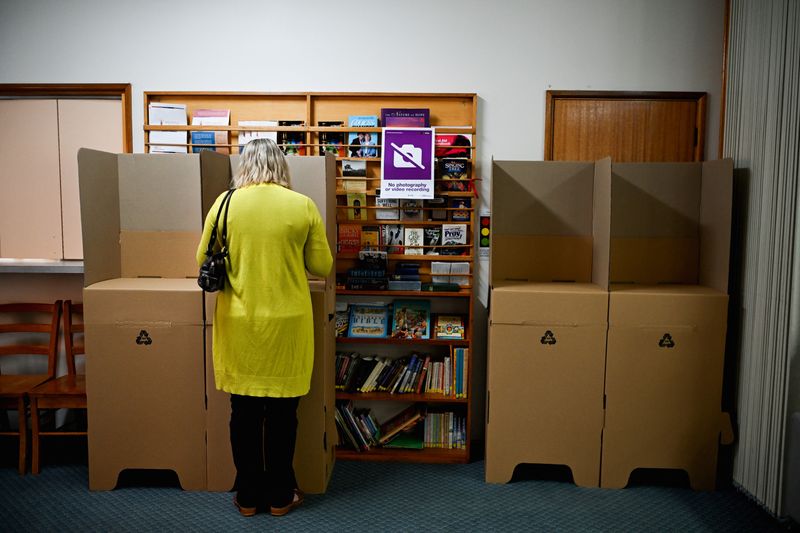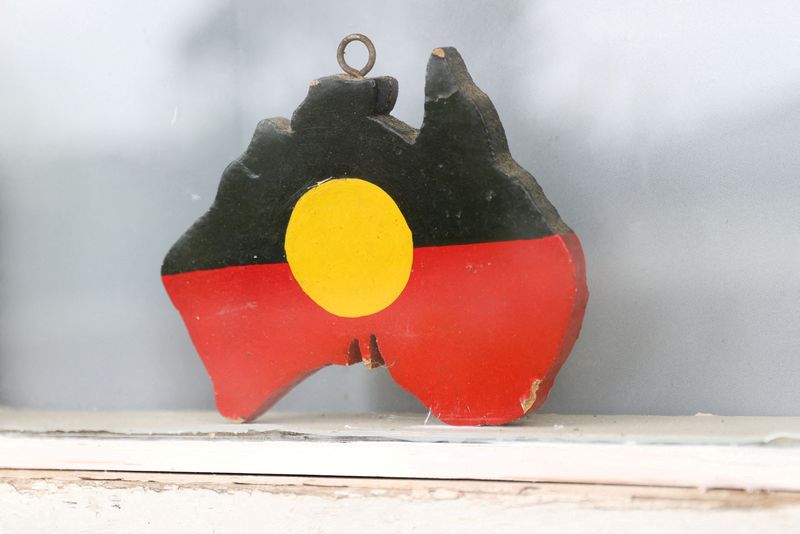By Praveen Menon, Lewis Jackson and Wayne Cole
SYDNEY (Reuters) -Australia on Saturday decisively rejected a proposal to recognise Indigenous people in the constitution, in a major setback to the country's efforts for reconciliation with its First Peoples.
Australians had to vote "Yes" or "No" in the referendum, the first in almost a quarter of a century, on the question of whether to alter the constitution to recognise Aboriginal and Torres Strait Island people through the creation of an Indigenous advisory body, the "Voice to Parliament".
Nationwide, with almost 70% of the vote counted, the "No" vote led "Yes" 60% to 40%. Australian broadcaster ABC and other TV networks have projected that a majority of voters in all six of Australia's states would vote against altering the 122-year-old constitution.
A successful referendum requires at least four of the six to vote in favour, along with a national majority.
Prime Minister Anthony Albanese acknowledged it was not the outcome he had hoped for but said the country would have to seek a new way forward for reconciliation.
"Our nation's road to reconciliation has often been hard going," Albanese said in a televised news conference.
"Tonight is not the end of the road and is certainly not the end of our efforts to bring people together."
Academics and human rights advocates fear the win by the "No" camp could set back reconciliation efforts by years.
The Voice to Parliament was proposed in the Uluru Statement from the Heart, a 2017 document crafted by Indigenous leaders that set out a roadmap for reconciliation with wider Australia.
Australia's Indigenous citizens, who make up 3.8% of the country's 26 million population, have inhabited the land for about 60,000 years but are not mentioned in the constitution and are, by most socio-economic measures, the most disadvantaged people in the country.
Supporters of the proposal believed entrenching an Indigenous Voice into the constitution would unite Australia and usher in a new era with its Indigenous people.
Many Indigenous people favoured the change, but some said it was a distraction from achieving practical and positive outcomes.
The political opposition has criticised the measure, saying it is divisive, would be ineffective, and would slow government decision-making.
"I'm devastated," Indigenous leader and prominent "Yes" campaigner Thomas Mayo said on ABC News.
"We need a Voice. We need that structural change."
SETBACK FOR ALBANESE
Referendums are difficult to pass in Australia, with only eight of 44 succeeding since the country's founding in 1901. This is the first referendum in Australia since voters rejected a proposal to become a republic almost a quarter of a century ago.
In 1967, a referendum to count Indigenous people as part of the Australian population was a resounding success with bipartisan political support.
This year's referendum, however, has not garnered unified support, with leaders of the major conservative parties campaigning for a "No" vote.
No referendum has passed in Australia without bipartisan backing.
The Voice has been a key feature of Prime Minister Albanese's term in office, and a referendum loss would stand out, political analysts say, as his biggest setback since coming to power in May last year.
Opposition leader Peter Dutton criticised Albanese for holding a referendum "that Australia did not need to have".
"The proposal and the process should have been designed to unite Australians, not to divide us," he told a news conference after the result was known on Saturday.
A misinformation campaign that spread through social media also sparked fear that the Voice - a purely advisory body - would become a third chamber of parliament, resulting in more federal aid to Aboriginal people, and more disputes between Indigenous and non-Indigenous people.

Albanese also criticised some sections of the media that he said had steered the referendum debate away from the core issues.
"We have had, including in outlets represented in this room, discussions about a range of things that were nothing to do with what was on the ballot paper tonight," Albanese said.
